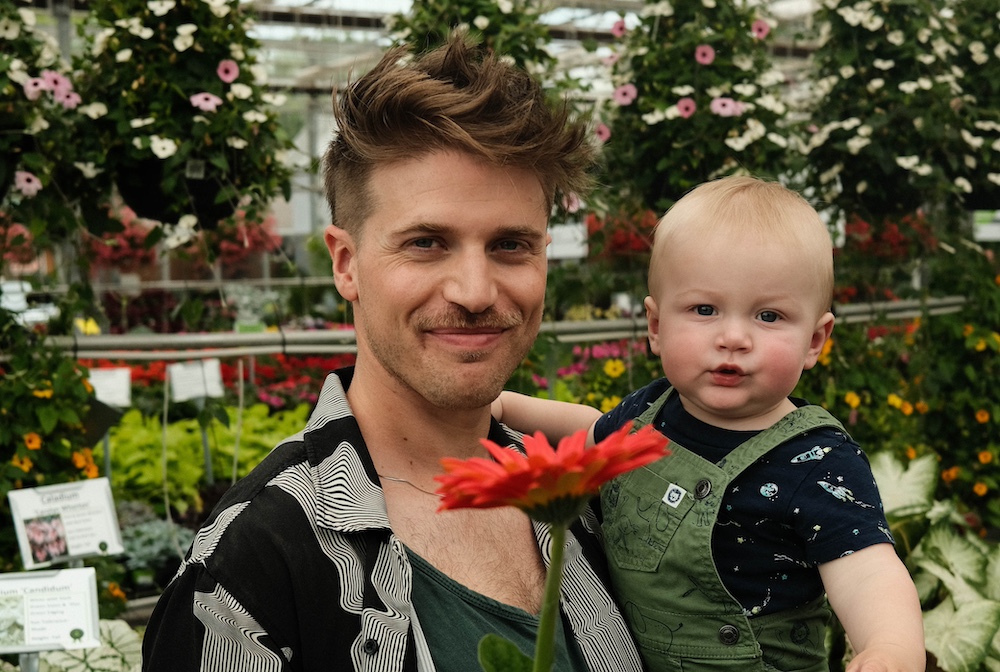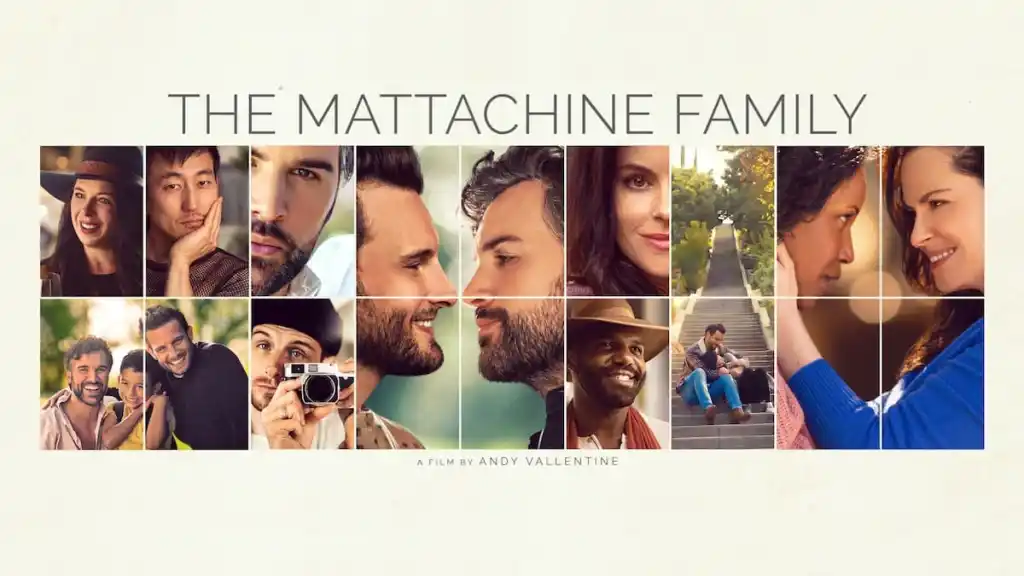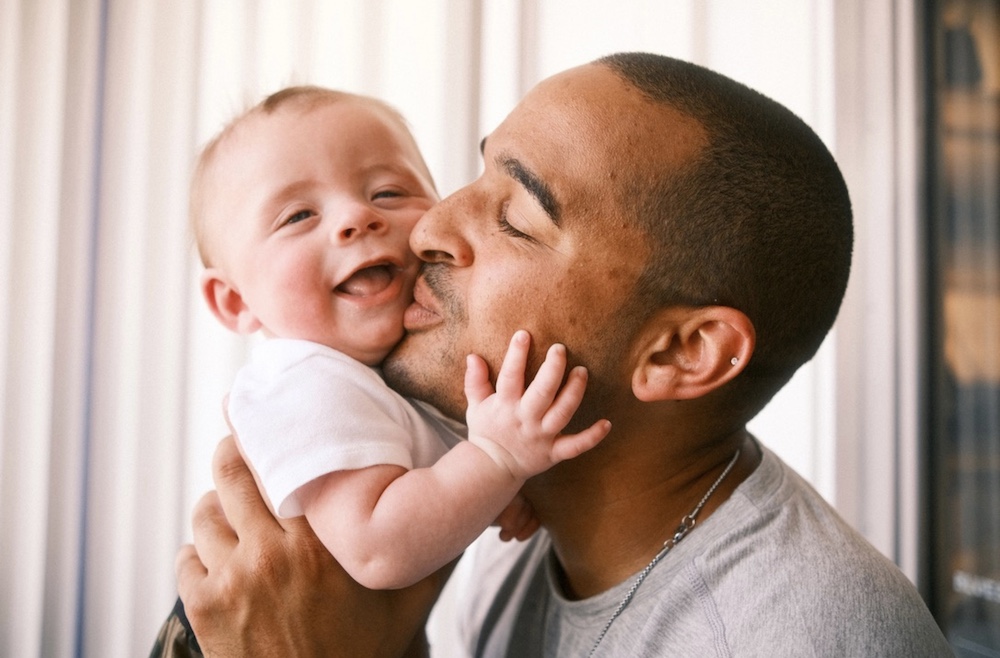I’ve never given much thought to having children, a fact that often surprises the people in my life. “You’d make such a great father!” friends and family will say, or at least the ones who have never seen me hold a newborn like a radioactive sack of potatoes. The truth is, as a single, gay 30-year-old with the parental instincts of a brick wall, I always considered the idea of being a father of any variety — biological or otherwise — on an orbit so far removed from the center of my universe that’s it completely alien to me.
All of that quickly changed a year and a half ago when my good friends Tori and Kelly asked me to be their sperm donor. Suddenly, for the first time in my life, I was confronting the idea that some little human would be running around the world with my DNA. The thought was both terrifying and intriguing in equal parts, and I spent months vacillating back and forth from a state of pure shock (Really? They picked me?) to narcissism (Wow! They picked me!).
The novelty, however, was quickly replaced by a deep-seated anxiety about what it all meant to be entering a known-donor arrangement with two of my best friends. What would my role be in this child’s life? How involved would I be? How would I be known? Would it affect my friendship with Tori and Kelly? The questions were endless, and there were no easy answers.
Mistakenly, I first turned to the Internet for help. Maybe I could find examples of other known-donor arrangements that could serve as a model for my friends and me? But, just as consulting the Internet for advice on a minor health issue never fails to convince me of my imminent death, so too did my online research into sperm donation leave me certain that agreeing to help my friends would end in disaster. Just try searching for “known sperm donor” and see the headlines that pop up: “Why sperm donation is bad for dads and kids!” “Kansas sperm donor ordered to pay child support!” “Miami sperm donor wins custody battle!”
I’ll spoil the surprise: despite all the risks I read about, I ultimately said yes to my friends, and Kelly is now pregnant with a baby girl due this July. So, the deed is done, leaving me all the more eager to find examples of gay men who have served as donors without their entire world falling apart. I knew they must be out there, but they clearly weren’t online—apparently the headline, “Known donor situation works out beautifully for all involved” isn’t quite as eye-catching as, “Baby-crazed sperm donor sues lesbians for custody!”
Once I started asking around, though, everyone in my life seemed to know someone in a donor arrangement: my mother’s masseuse, a friend of my old boss’s, so-and-so’s neighbor down the street. Luckily for me, many of these donors, and the women they’ve helped to conceive, were more than happy to provide some insight into what has made their arrangements successful.
So, then, what’s the secret to making a known-donor arrangement work?
***
David, 51
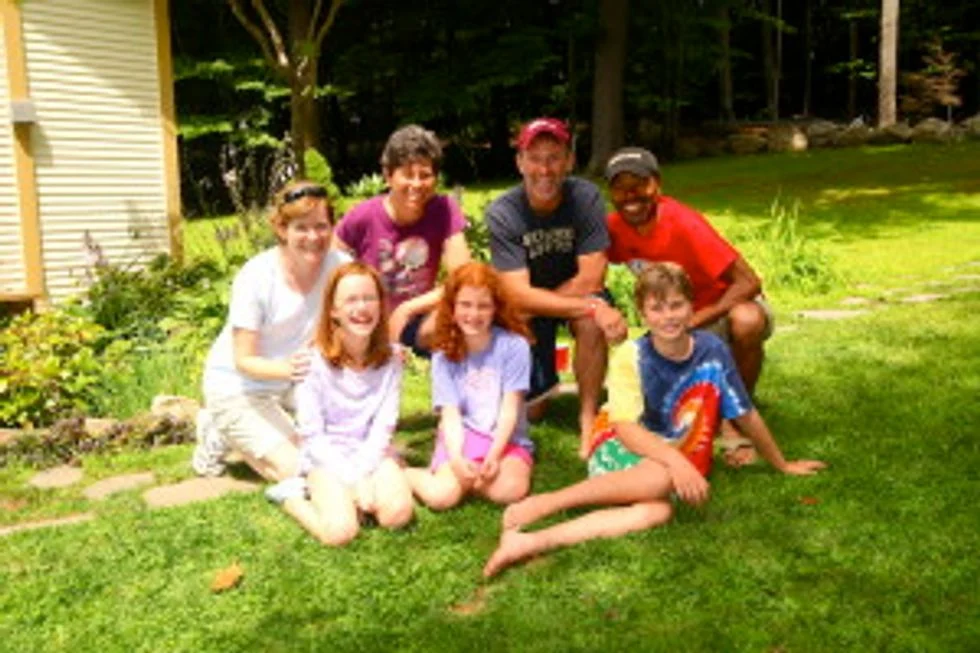
“Well, I’m not a ‘donor’ to my kids, I’m ‘dad,’” said David, when I asked what it’s been like for him as a “known donor.” “But I respect Kelly and Karen as the main caregivers,” he continued, referring to the women to whom he helped conceive. (Observant readers will note that we, too, have a Kelly and David in our trio—I’ve always maintained parents are just asking for their kid to turn out gay by naming him David.)
David met Kelly and Karen while living in the same Boston neighborhood, and the three became friendly with one another over the years. One night, Kelly and Karen took David out to dinner and asked him a life-changing question: would David consider being their donor? While this same request from my friends nearly caused my heart to stop, David’s didn’t miss a beat. “I’ve been waiting for this from you guys,” he told his friends. “I kind of always knew this was the road we’d go down.”
So, I was curious to know, at what point in the fourteen years since that original conversation did David realize he’d made a huge mistake? How many lawsuits have there been? How irreparably damaged are his friendships with Kelly and Karen? But try as I might, I found no evidence of drama in David’s arrangement with his neighbors. “It’s been the most amazing experience of my life,” he said. “It couldn’t have worked out better.”
As David elaborated on the arrangement he has with Kelly and Karen, it became clear why he doesn’t identify himself as a “known donor.” He is a father to his children and acts in the ways traditionally expected of one, attending parent-teacher conferences and family vacations, along with Kelly and Karen. Several years ago, he and his husband, Ben, bought the house next door to Kelly and Karen to allow them an even larger presence in the lives of his children.
“From the beginning, I said I wanted to be more than a special ‘Uncle’ figure,” David told me. “And Karen and Kelly have been exceedingly open to me and my role. It’s not like I need to work to carve out any space.” Though he notes he is not the primary caregiver, he is nonetheless very involved in the lives of his children—Matt, 14; Caroline, 13; and Abby, 11—seeing them on a near daily basis.
But David’s role as a father has played out in less expected ways as well. Caroline, David’s 13-year old, is actually Kelly’s biological niece. Caroline came to live with Kelly and Karen two years ago, and has come to refer to David as “dad” just like his biological offspring. As a result of their donor arrangement, in other words, all of their lives have become inseparably intertwined—and, according to David, for the better. “We’ve kind of evolved into this great big family now,” David said. “And it’s wonderful.”
There certainly is something appealing about this it-takes-a-village approach to a known-donor arrangement; but my friends and I, when we originally discussed the idea, never envisioned anywhere near this level of involvement on my part. From Kelly and Karen’s perspective, I also couldn’t help but wonder, wouldn’t it just be simpler to have a less involved donor? Aren’t there too many cooks in the kitchen? Apparently not. “We were willing to take a leap of faith, and I am so glad that we did,” Kelly wrote me via email. “Yes, we have a messy, modern family. There have been bumps in the road, but we have worked through it and have an arrangement that works for us.”
Could something like David’s arrangement with Kelly and Karen work for me and my friends? It’s difficult to imagine. I agreed to become a donor for Tori and Kelly so they could become mothers, not so I could become a father. On a purely selfish note, with work, travel, and friends consuming my days, I also doubt whether I could assume such responsibility with the same level of success as David.
“Be open to more involvement if that is how this arrangement organically evolves,” Kelly offered, as a final piece of advice. “Kids can only benefit from having more caring adults in their lives, provided you and the moms continue to have open and good communication.” Fair enough; my friends and I will keep an open mind. But I also don’t have plans to move next door to them anytime soon.
***
Jeff, 44
On the other end of the donor-daddy spectrum is Jeff—who pointed out that, while he might be a donor to the child he helped conceive, he isn’t “daddy.” Jeff, like me, was asked by two good friends to donate. Thanks to his help, they now have a two-and-a-half-year-old son, with another one on the way, due this August. Among the donors I’ve had the opportunity to speak with, Jeff’s circumstances are unique in that he and his friends live in different cities; Jeff lives in St. Louis, Missouri, and they reside in Philadelphia. As a result, Jeff sees his biological offspring about six times a year.
So how has it worked out for Jeff, being involved from a distance? What does this version of a known-donor arrangement look like? “I’m an Uncle to [my friends’ child], just like I am to five other kids,” he said, referring to his biological nieces and nephews. “I might be a ‘special’ Uncle to him, but I don’t offer opinions on how to raise him. I just try to be a good person in his life, be around when I can, and be full of love. But we’re all clear that he’s not my kid.”
My situation is similar to Jeff’s in that Tori and Kelly are not looking for a father or co-parent for their children. But unlike Jeff, distance will not be a limiting factor in my involvement. With my friends living a short 20-minute subway ride away from me in New York City, I have the opportunity to be around on a more regular basis. My friends have been nothing but encouraging of my involvement, but in practice, might it be threatening to have someone with a “special” connection to their child hanging around all the time?
“Once you set the stage that you know this isn’t your kid, things are easier from there,” Jeff told me, when I raised this concern with him. Originally, Jeff said there were some questions on the part of his friends as to how large of a role he might want to play in their child’s life. “But first impressions are really helpful,” he said. After his friends’ son was born, Jeff flew to Philadelphia to stay with them for a while. Rather than inserting himself into any of the childrearing, he instead helped around the house, cleaning the microwave and buying groceries. This, moreover, is generally the role Jeff has continued to play. “When I’m around, I just try to be helpful,” he said.
Jeff’s main advice to me, then: be clear with my friends that I know my role. “It makes a difference if you’re just trying to be a good friend supporting a family, rather than a ‘special uncle’ demanding to see the kid,” he said. “I made sure to set the tone early on that I know my role in all of this,” he continued, “and I think my friends would like more of me rather than less.” And now, rather than harboring any concern over his involvement, “they forward me job applications in Philadelphia,” he said with laugh.
***
Corey, 40
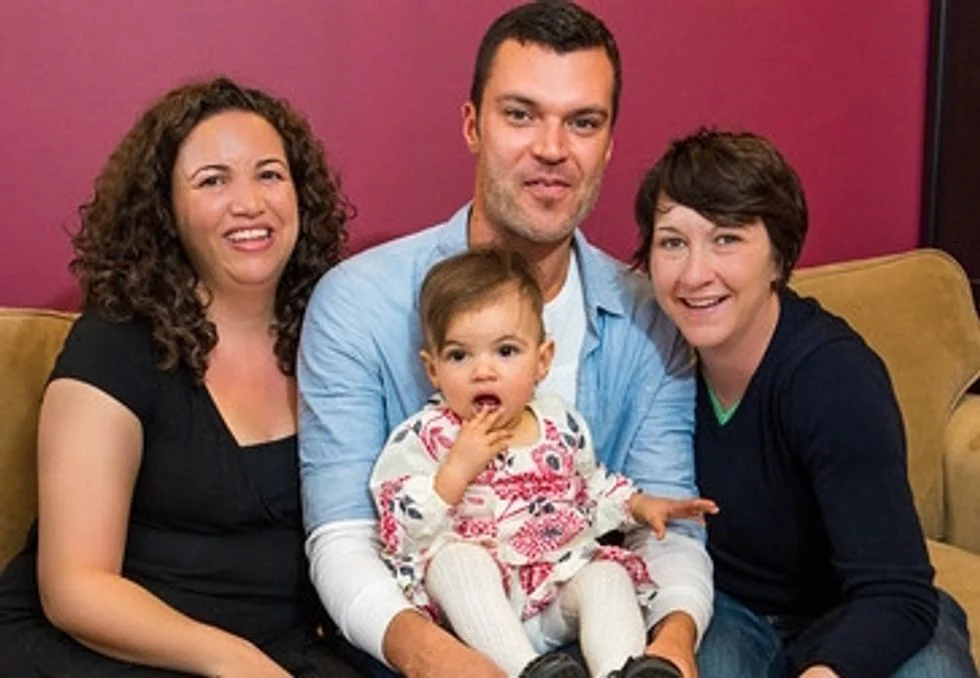

Corey has always wanted children, so when a friend approached him several years ago to ask if he’d be interested in being a donor for a couple looking to start their family, Nicole and Colleen, he was intrigued by the idea. The three had actually never met before, but got to know one another over the course of several months. “We all went out for drinks several times to talk about how it all might play out,” Corey said. “We discussed specifics, and it sounded perfect.”
Of the three donors highlighted in this article, Corey’s involvement falls somewhere in the middle. Corey—who lives a fifteen-minute drive from Nicole and Colleen in New York City—sees his biological daughter, Leila, who is about to turn 3, about once a week. “Unless my mother comes to visit,” he laughs. “Then I see her five days in a row.” Leila refers to Corey as “dad,” but he plays more of what he calls the “fun-uncle” role. “We get to go have adventures and play,” he says of their arrangement. “It’s kind of ideal.” Corey also has a couple of additional adventure buddies on the way; Nicole is pregnant with twins that Corey also helped to conceive, and is due any day.
I could envision maintaining a level of involvement similar to Corey’s— involved, but not too involved—and who doesn’t love a good adventure? But while Corey is comfortable being known as a “father,” my friends and I felt it implied too much of a parental role on my part. Even if I’m around on a fairly regular basis, I won’t be the one shouldering the responsibilities of parenting 24 hours a day, 7 days a week.
But Corey makes a clear distinction between what it means to be a father and a primary caregiver. “I wouldn’t have done this if I wasn’t going to be known as the father,” he said. “I wanted full disclosure as to who I am to this child.” But Corey also respects his more limited role. “Nicole and Colleen may take my views into consideration, but they will do what they think is best for Leila without hesitating,” Corey said. “And I respect that. At the end of the day, she calls me daddy, but she’s their child.”
Did it bother Nicole and Colleen that Corey got to be a father without assuming the responsibilities of a full-time parent? Far from it, it turns out. “We specifically wanted someone who our future children would know as their dad,” Nicole said, who playfully refers to Corey as their “baby daddy.”
Nicole says they also approach their arrangement with a certain ease, which has helped contribute to its success. “We don’t ask a lot of each other, and we trust each other to be open about what we need from each other,” she said. “We’re all just kind of relaxed about it. For people that like things more spelled out, I can see why our kind of relationship might be troubling, but it works for us.”
Though their arrangement has been fairly drama free, Corey admits it was a bit difficult at first integrating Leila into his life. “I work a busy, regular job, and have a busy social schedule,” he said. This is a concern of mine, too. What exactly have I signed up for? How drastically should I expect my life to change?
Corey’s life has certainly changed, he said, but for the better. “I realized if I want to be a part of this child’s life, I’m going to have to be really disciplined about it,” Corey explained. But now, “it’s something that comes naturally,” he continued. “The time I get to spend with her is my best time. It’s something I look forward to. It’s not like, ‘oh I can’t do this or that because of Leila.’ Now, I schedule things around her.”
***
David, Jeff, and Corey’s experiences help highlight the wide range of possibilities that exist within the world of known donors. Some donors are “dad” to the children they helped conceived, some are not. Some play an active parenting role, while others are involved at a distance. Most importantly, despite their differences, all the donors I spoke with demonstrate that it’s possible to make known-donor arrangements work, without being sued, ruining friendships, or being featured on an episode of Jerry Springer.
While I’m heartened to have found these positive examples, none seem able to serve as a perfect model for my friends and me. These conversations have been extremely useful, and I hope to apply much of what I learned to my own arrangement with Tori and Kelly. But the general outlines surrounding each of these donor arrangements differ in significant ways to my own, which is a bit disappointing. It would be so much easier to pattern our arrangement off of someone else’s successful example. Simply cut and paste. But, as David told me, “There is no cookie cutter model. Our arrangement works well for our family, but it very well might not for you or someone else.” Fine, I get it; we’re all unique snowflakes and my friends and I will need to develop an arrangement that works with our own distinctive set of circumstances. No one can do it for us. With Kelly’s due date now just over a month away, though, I sought one final piece of advice: how can I best prepare for what I’m about to go through?
The general response can be summed up in a phrase: calm down.
“Just relax!” Corey said. “Don’t put so many expectations on everything. There’s no way you can really prepare for what you’re about to go through.”
“Let things develop as they develop,” Jeff agreed. “Don’t worry unless there’s something to worry about.”
It’s in my nature to worry, but I’m trying my best to heed this advice. And hopefully so, too, will the next poor soul to turn to the Internet for advice after being approached by friends to donate. While they still won’t find an instruction manual amid all the doomsday scenarios online, it’s my hope that they’ll at least stumble across this article and find the stories of these three men, each of whom is making a unique version of a known-donor arrangement work, all at an impressively low-drama frequency. These success stories may not make for the catchiest headlines, but they do show just how good the experience of being a known donor can be.
I’ll also be sure to keep up with my own experiences in future Gays With Kids posts.


